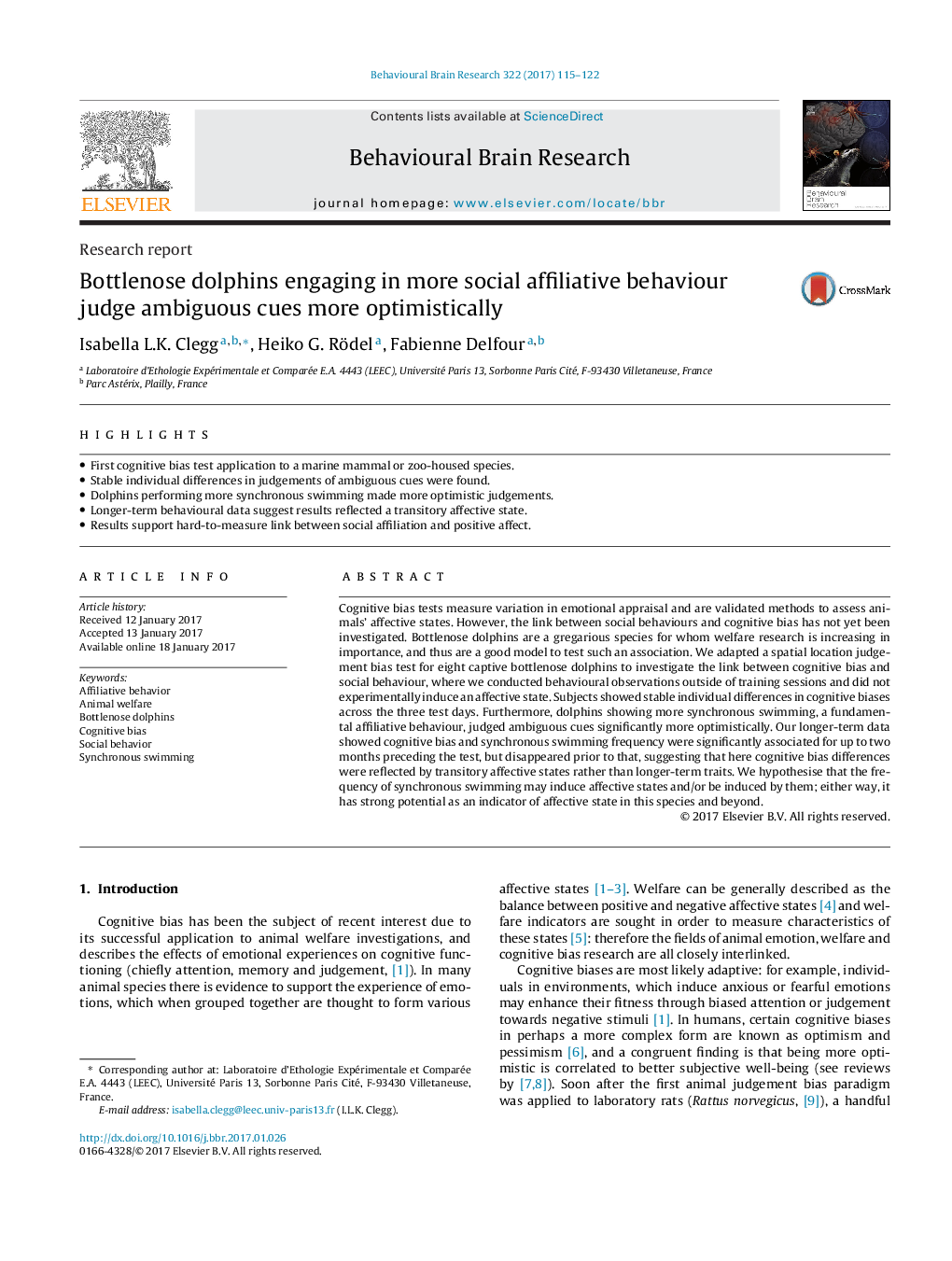| کد مقاله | کد نشریه | سال انتشار | مقاله انگلیسی | نسخه تمام متن |
|---|---|---|---|---|
| 5735521 | 1411868 | 2017 | 8 صفحه PDF | دانلود رایگان |
عنوان انگلیسی مقاله ISI
Bottlenose dolphins engaging in more social affiliative behaviour judge ambiguous cues more optimistically
ترجمه فارسی عنوان
دلفین های بطری مشارکت در رفتار اجتماعی بیشتر ادعا می کنند که نشانه های مبهم بیشتر خوش بین هستند
دانلود مقاله + سفارش ترجمه
دانلود مقاله ISI انگلیسی
رایگان برای ایرانیان
کلمات کلیدی
رفتار وابسته، رفاه حیوانات، دلفین های بطری تعصب شناختی، رفتار اجتماعی، شنا همزمان
ترجمه چکیده
آزمون های تعصب شناختی، تغییرات در ارزیابی احساسی را اندازه گیری می کنند و روش های معتبر برای ارزیابی وضعیت های عاطفی حیوانات هستند. با این حال، ارتباط بین رفتارهای اجتماعی و تعصب شناختی هنوز مورد بررسی قرار نگرفته است. دلفین های بطری، گونه های گیاهی هستند که برای تحقیقات رفاهی آنها اهمیت فراوانی می یابد و به همین دلیل یک مدل خوب برای آزمایش چنین ارتباطی است. ما یک تست محرمانه قضایی مکانی برای هشت اسلحه دلفین را برای بررسی ارتباط بین تعارض شناختی و رفتار اجتماعی تطبیق دادیم، جایی که مشاهدات رفتاری را خارج از جلسات آموزشی انجام دادیم و به طور تجربی حالت عاطفی را تحریک نکردیم. در طی سه روز آزمایشی، تفاوتهای فردی پایدار در پیشگیری های شناختی وجود داشت. علاوه بر این، دلفین ها نشان می دهد که شنا بیشتر همزمان، یک رفتار وابسته بنیادی، نشانه های مبهم را به طور قابل توجهی بیشتر خوش بینانه ارزیابی می کند. داده های طولانی تر ما نشان می دهد که تعارض شناختی و فرکانس شناور همزمان تا دو ماه قبل از آزمون به طور قابل توجهی ارتباط داشتند، اما قبل از آن ناپدید شد، و این نشان می دهد که در اینجا تفاوت های متعصب شناختی با حالت های مؤثر گذرا به جای ویژگی های طولانی مدت منعکس شده است. ما فرض می کنیم که فرکانس شناور همزمان می تواند باعث ایجاد حالت های عاطفی و / یا توسط آنها شود؛ به هر حال، این پتانسیل قوی به عنوان نشان دهنده وضعیت عاطفی در این گونه و فراتر از آن است.
موضوعات مرتبط
علوم زیستی و بیوفناوری
علم عصب شناسی
علوم اعصاب رفتاری
چکیده انگلیسی
Cognitive bias tests measure variation in emotional appraisal and are validated methods to assess animals' affective states. However, the link between social behaviours and cognitive bias has not yet been investigated. Bottlenose dolphins are a gregarious species for whom welfare research is increasing in importance, and thus are a good model to test such an association. We adapted a spatial location judgement bias test for eight captive bottlenose dolphins to investigate the link between cognitive bias and social behaviour, where we conducted behavioural observations outside of training sessions and did not experimentally induce an affective state. Subjects showed stable individual differences in cognitive biases across the three test days. Furthermore, dolphins showing more synchronous swimming, a fundamental affiliative behaviour, judged ambiguous cues significantly more optimistically. Our longer-term data showed cognitive bias and synchronous swimming frequency were significantly associated for up to two months preceding the test, but disappeared prior to that, suggesting that here cognitive bias differences were reflected by transitory affective states rather than longer-term traits. We hypothesise that the frequency of synchronous swimming may induce affective states and/or be induced by them; either way, it has strong potential as an indicator of affective state in this species and beyond.
ناشر
Database: Elsevier - ScienceDirect (ساینس دایرکت)
Journal: Behavioural Brain Research - Volume 322, Part A, 30 March 2017, Pages 115-122
Journal: Behavioural Brain Research - Volume 322, Part A, 30 March 2017, Pages 115-122
نویسندگان
Isabella L.K. Clegg, Heiko G. Rödel, Fabienne Delfour,
